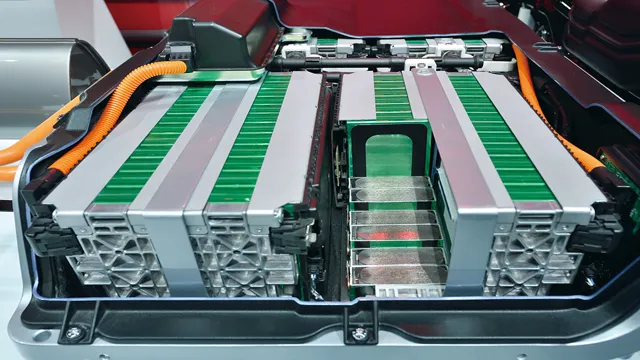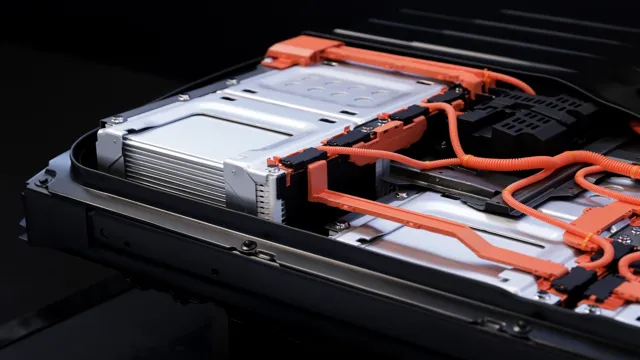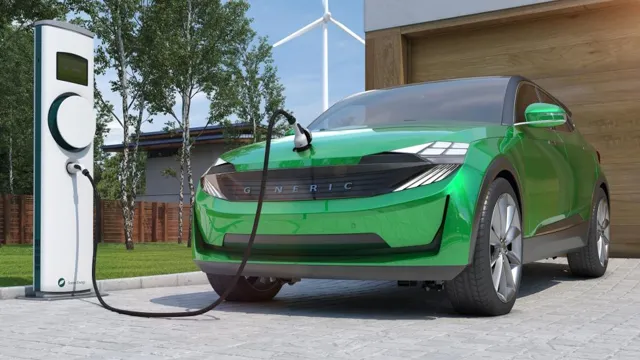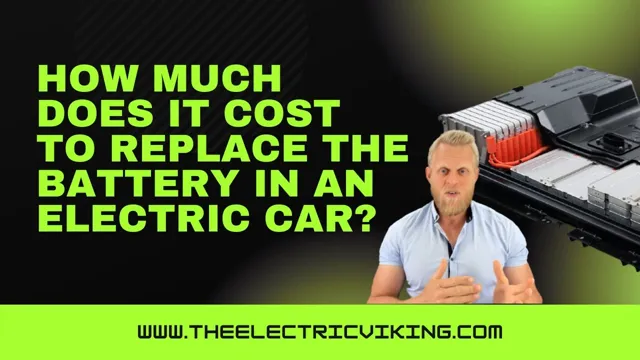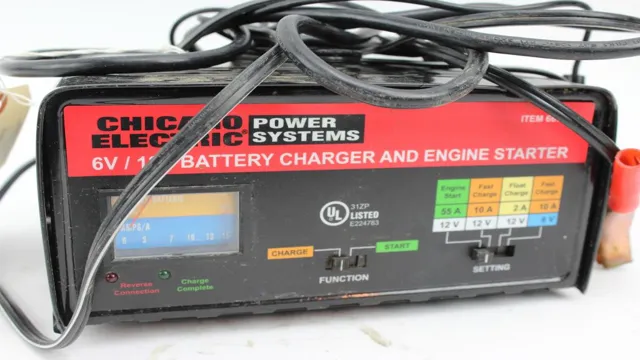Revealed: The Real Cost of Owning an Electric Car – Analyzing the Price of Batteries
Electric cars are the future of transportation, and the cost of batteries is a crucial factor in their widespread adoption. For years, electric car battery costs have been a significant barrier to entry for many people. However, the situation is starting to change as the cost of batteries continues to decrease.
This change is thanks to advances in technology, increased demand, and a growing number of manufacturers entering the market. As a result, electric car battery costs are falling quickly, and there are many reasons why this trend is set to continue. In this blog, we’ll explore the latest developments in the electric car battery industry, and what they mean for the future of electric transportation.
Average Battery Costs
When it comes to electric cars, one of the biggest concerns for potential buyers is the cost of batteries. The cost of batteries for electric cars has been steadily decreasing over the years, which is good news for consumers. However, there are still some factors that can affect the cost, such as the size of the battery, the type of battery, and the manufacturer.
On average, the cost of a battery for an electric car can range anywhere between $5,000 to $15,000. This might seem like a hefty price tag, but it’s important to remember that electric cars have lower overall maintenance costs, as they have fewer moving parts and don’t require oil changes. Additionally, many states and countries offer tax incentives and rebates for purchasing electric cars, which can help offset the cost of the battery.
Overall, while the cost of batteries for electric cars is still substantial, it’s important to consider the long-term benefits and potential savings that come with driving an electric car.
Battery Costs by Model Type
Battery costs can be a significant factor in choosing an electric car. The average battery cost for electric vehicles varies depending on the model type. Battery costs can range from $5,500 to over $20,000, with the average being around $13,000.
For example, plug-in hybrid electric vehicles typically have lower average battery costs compared to all-electric vehicles. This is due to the fact that plug-in hybrids rely on gas engines and smaller battery packs, whereas all-electric vehicles require larger and more expensive battery packs. Additionally, luxury electric vehicles tend to have higher average battery costs compared to standard electric vehicles.
However, the cost of batteries has significantly decreased over the years, making electric vehicles more affordable for consumers. As the demand for electric vehicles continues to increase, it is expected that battery costs will continue to decrease, making them even more accessible to the general public.
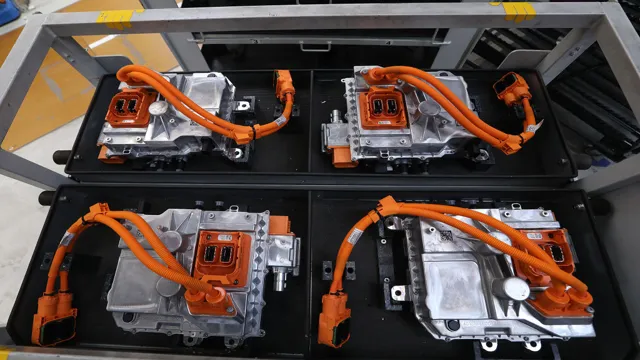
Battery Life Expectancy
Battery life expectancy is a crucial factor to consider when purchasing a new electronic device. The average battery costs can vary greatly depending on the device and the type of battery it requires. Generally, lithium-ion batteries are the most common battery type and have a longer life expectancy than other battery types.
However, the cost of lithium-ion batteries can be more expensive than other types of batteries. It is also important to note that the battery life expectancy can be influenced by several factors including usage patterns, temperature, and charging methods. To get the most out of your battery, it is essential to properly maintain it.
This includes avoiding extreme temperatures, avoiding overcharging or completely discharging the battery, and using the device regularly. By taking care of your battery, you can extend its life expectancy and save money on replacement costs in the long run.
Factors Affecting Battery Costs
The cost of batteries for electric cars is a major concern for consumers looking to switch to a more environmentally friendly mode of transportation. There are several factors that contribute to the high cost of these batteries, including materials, technology, and manufacturing processes. First, the materials required to produce these batteries can be expensive, including rare earth metals such as cobalt which are often mined in unstable regions, leading to price volatility.
Additionally, research and development into battery technology is ongoing, driving up costs in the short term. Finally, the manufacturing process for these batteries is complex and requires specialized equipment and skills, contributing to higher costs overall. However, as demand for electric cars grows and production scales up, it is expected that costs will decrease over time, making these vehicles more accessible to the average consumer.
Manufacturing Costs
When it comes to the manufacture of batteries, the costs involved can vary depending on a number of different factors. One of the key factors that can impact battery costs is the materials used in their production. High-quality materials like lithium-ion can be more expensive, but they also tend to produce batteries that are more efficient and longer-lasting overall.
Additionally, the manufacturing process itself can have a huge impact on the final cost of a battery. For example, if a manufacturer uses inefficient or outdated production methods, this can drive up the costs of producing each battery and make the final cost for consumers higher as well. Ultimately, the goal for any battery manufacturer is to strike a balance between using high-quality materials and production methods while still maintaining an affordable price point for consumers.
By doing so, manufacturers can help make batteries more accessible to a wider range of people while still producing the high-quality products that people need to power their electronics and other devices.
Material Costs
When it comes to the cost of batteries, there are several factors that influence the price of materials which, in turn, affects the overall cost. One major factor is the demand for raw materials. As the demand for key materials like lithium and cobalt increases, the price of these materials rises due to limited availability.
Additionally, the type of battery being produced can also affect the cost of materials. For example, lithium-ion batteries are currently the most popular type of batteries used in electric vehicles because they offer the highest energy density. However, they tend to be more expensive than other types of batteries.
Furthermore, the production process can also impact the cost of battery materials. More sophisticated manufacturing processes that require higher levels of precision and quality control can be more expensive than simpler methods. Other factors that can impact material costs include the size and capacity of the battery and the location of the manufacturing plant.
Overall, managing material costs is a critical component of maintaining competitive pricing for batteries.
Market Demand and Supply
When it comes to battery costs, there are a number of factors that can impact the market demand and supply. One of the biggest drivers is the cost of raw materials, such as lithium and cobalt, which are essential for battery production. Any changes in the availability or price of these materials can have a big impact on the cost of batteries.
Another factor is the level of competition in the market, with more competition leading to lower prices and vice versa. Additionally, advances in technology can also play a role in battery costs, with more efficient and effective manufacturing methods resulting in cost savings. Overall, fluctuations in these and other variables will continue to impact battery costs in both the short and long term, highlighting the importance of ongoing market analysis and innovation.
Ways to Reduce Battery Costs
The cost of batteries for an electric car can be a significant factor in the overall price of the vehicle. Fortunately, there are ways to reduce these costs. One way is to purchase a used battery instead of a new one.
Used batteries that still have a decent amount of life can often be found at a lower price, presenting a more economical option for those on a budget. Another way to lower battery costs is to invest in a battery management system. This technology can help extend the life of the battery and ensure it is functioning optimally, reducing the need for costly replacements.
Finally, some electric car manufacturers offer lease options for their batteries, which can present a more affordable alternative to buying a brand new battery upfront. By exploring these options, electric car owners can save money on their battery costs while still enjoying the benefits of an eco-friendly vehicle.
Government Incentives and Rebates
As electric vehicles become more and more common, governments around the world are offering incentives and rebates to help make them more accessible. One way to reduce the cost of owning an electric vehicle is to take advantage of these programs. In many places, there are tax credits available for those who purchase EVs, as well as incentives for installing home charging stations.
Other countries offer free parking, reduced tolls, and other perks to encourage EV adoption. By taking advantage of these incentives, drivers can reduce their upfront costs and make owning an electric vehicle more affordable. Additionally, as battery technology continues to improve, the cost of producing and buying batteries is expected to decrease over time.
Some experts predict that battery costs could drop by as much as 50% within the next few years. This could make electric vehicles even more attractive to budget-conscious consumers looking for an environmentally-friendly option. In the meantime, though, it’s worth exploring government incentives and other cost-saving measures to make owning an EV more financially viable.
Energy Efficient Driving Habits
Energy-efficient driving habits can have a significant impact on reducing battery costs. One of the easiest ways to do this is to drive at a steady pace and avoid sudden acceleration and hard braking. These maneuvers can take a toll on the battery, making it work overtime, which can ultimately shorten its lifespan.
Another effective strategy is to keep the tires properly inflated, which not only enhances the vehicle’s fuel efficiency but also eases the burden on the battery. Additionally, minimizing the use of auxiliary systems, such as air conditioning and sound systems, can also reduce the load on the battery. By adopting these simple habits, you can extend your battery’s life and save yourself some money in the long run while helping the environment.
Conclusion
In the world of electric cars, the cost of batteries is often seen as the elephant in the room. But let’s face it, keeping an elephant fed and happy is no easy feat either. Ultimately, the cost of batteries for electric cars will continue to evolve as technology improves and mass production ramps up.
So, while it’s important to consider the cost when purchasing an electric vehicle, let’s not forget that every time we charge up our battery, we’re helping to reduce our carbon footprint and drive towards a cleaner, greener future. Now, let’s charge ahead with some elephant-sized enthusiasm!”
FAQs
What is the average cost of batteries for an electric car?
The average cost of batteries for an electric car depends on the make and model of the car, but it typically ranges between $5,000 and $15,000.
How often do you have to replace the batteries in an electric car?
The lifespan of the batteries in an electric car varies depending on usage and climate, but they typically last between 8-10 years before needing to be replaced.
Can you upgrade the batteries in an electric car?
Some electric car manufacturers may offer battery upgrades, but it can be costly. It’s important to research and compare the costs and benefits of upgrading before making a decision.
Are there any government incentives for purchasing an electric car with regard to battery cost?
Yes, some government incentives may help offset the cost of purchasing or replacing batteries in an electric car. It’s important to check with your local and state government for available incentives.
